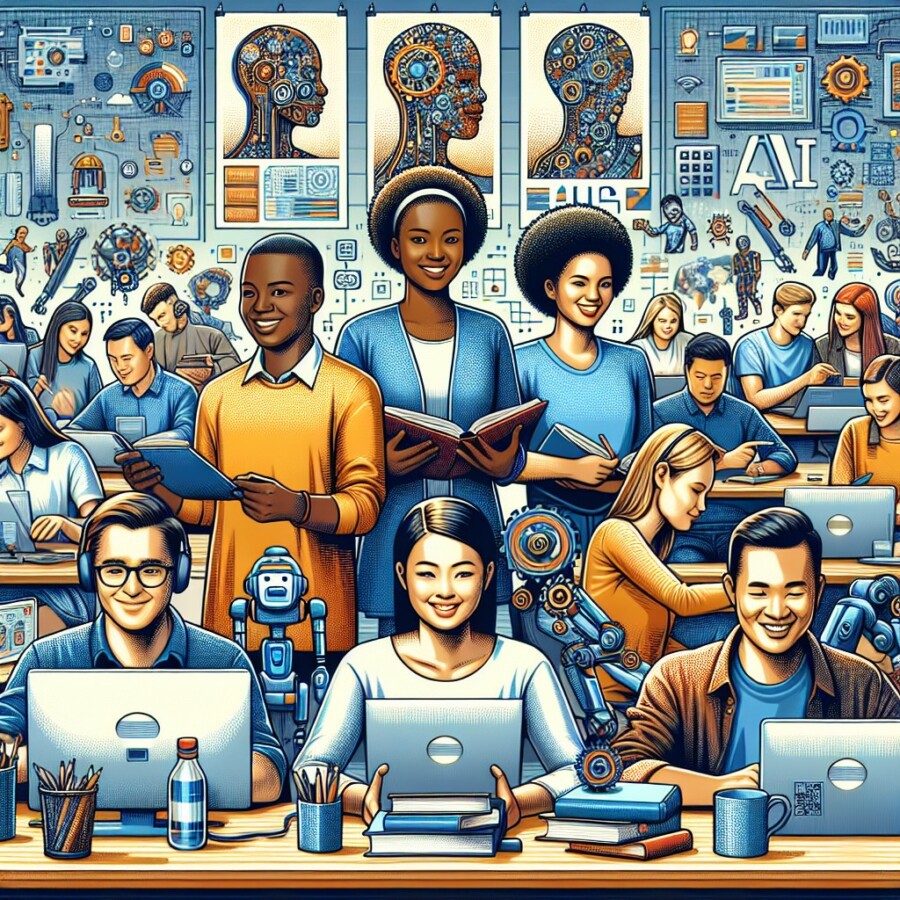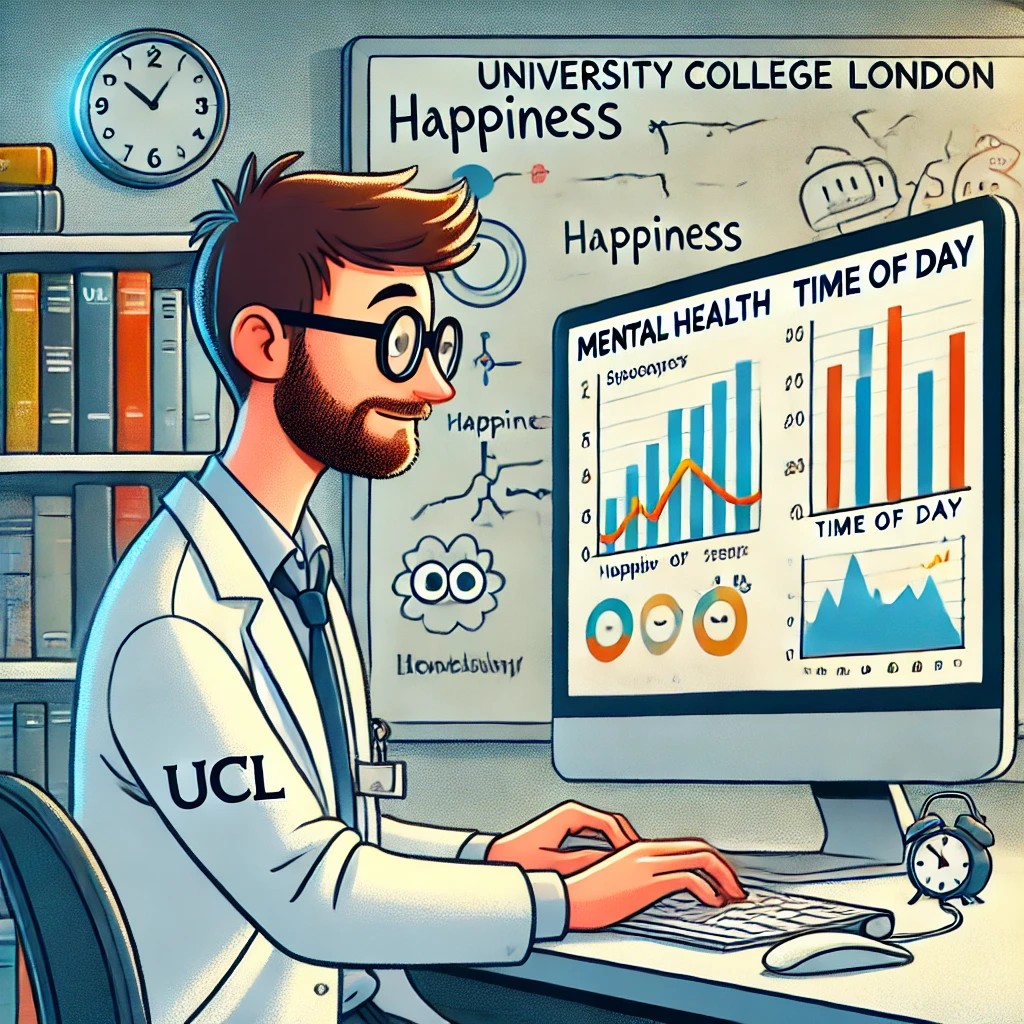A new report by the Resolution Foundation has found that young people in their early 20s are more likely to be out of work because of poor health compared to those in their early 40s. This is a big change from before, when older people were more likely to be unemployed due to sickness. The report says that more young people are struggling with mental health problems, which can make it harder for them to do well in school and find a job. In 2023, 5% of young people couldn’t work because of their health. The report also shows that young people now have the highest rates of mental health disorders compared to any other age group.
The study shows that in 2021/22, 34% of young people aged 18 to 24 had symptoms of a mental disorder, like feeling sad or anxious. This is a big increase from 2000 when the number was 24%. Because of this, over half a million 18 to 24-year-olds were given anti-depressants in 2021-22. The report says that poor mental health has the worst impact on young people who don’t go to university. One in three young people without a degree are currently unemployed because of a mental health problem.
The research also shows that young women are more likely to have mental health problems than young men. 41% of women and 26% of men said they had mental health issues. Also, 79% of 18 to 24-year-olds who couldn’t work because of their health had qualifications at GCSE level or lower, compared to 34% of all people that age. The report says that if young people have poor mental health when they’re 11 to 14 years old, it can make it harder for them to do well in school. They’re three times more likely to fail five important exams, including English and Maths.
The Resolution Foundation wants colleges and sixth forms to have better mental health support, and they want to improve education for young people. The Health Foundation, which paid for the research, says that having a good job and going to school are really important for staying healthy. They want the government to take action to stop young people from being affected by poor mental health. Experts also say that the UK needs to work together to solve the mental health crisis, with more money and programs to help people early on.
Gary Siva, who works for an online mental health platform called Zumos, says that we need to help young people with their mental health right away. He thinks that things like social media have made it so that people care more about what their friends online think than what they think of themselves or what their family thinks. Siva also says that problems like bullying used to only happen at school, but now they can happen anywhere. The study used information from the Labour Force Survey, although the Office for National Statistics has stopped doing the survey because fewer people are taking part. But the Health Foundation
Original news source: More people in early 20s out of work from ill health than early 40s – study (BBC)
🎧 Listen:
Slow
Normal
Fast
📖 Vocabulary:
| 1 | Resolution | The act of finding a solution to a problem or conflict |
| 2 | Unemployed | Not having a job |
| 3 | Disorders | Illnesses or conditions that affect your mind |
| 4 | Symptoms | Signs that show there is a problem, especially with your health |
| 5 | Anti-depressants | Medicines used to treat depression |
| 6 | Qualifications | Proofs that you have finished courses or passed exams |
| 7 | Impact | The effect or influence something has |
| 8 | Degree | An academic achievement awarded by a university or college |
| 9 | Research | The detailed study of something to discover new information |
| 10 | Foundation | An organization set up to provide support and fund research |
| 11 | Crisis | A serious situation that needs immediate attention |
| 12 | Platform | A place on the internet where you can share and discuss ideas |
| 13 | Bullying | The act of being mean to someone repeatedly over time |
| 14 | Survey | A detailed examination of opinions or behavior conducted by asking people questions |
| 15 | Statistics | The collection and analysis of numerical data in large quantities |
Group or Classroom Activities
Warm-up Activities:
– News Summary
Instructions: Divide the class into small groups. Provide each group with a copy of the article. Instruct them to read the article carefully and then work together to create a concise summary of the main points. After a designated time, have each group share their summaries with the class.
– Opinion Poll
Instructions: Write several discussion questions related to the article on the board. Divide the class into pairs or small groups. Instruct them to discuss the questions and record their opinions. After a designated time, bring the class back together and have each group share their opinions with the class.
– Word Association
Instructions: Choose several key vocabulary words from the article. Write each word on a separate index card. Distribute the cards randomly to the students. Instruct them to move around the room and find a partner. Once they find a partner, they must use the word on their card to start a conversation. After a designated time, have the students find new partners and repeat the process with a new word.
– Sketch It
Instructions: Divide the class into pairs. Provide each pair with a blank sheet of paper and a pencil. Instruct one student in each pair to describe a scene or concept from the article, while the other student sketches it based on the description. After a designated time, have the pairs switch roles and repeat the activity.
– Future Predictions
Instructions: Instruct the students to imagine that they are experts in mental health and education. Ask them to work individually to brainstorm a list of predictions for the future based on the information in the article. After a designated time, have the students share their predictions with a partner. Then, bring the class back together and have a few students share their predictions with the class. Encourage them to explain their reasoning behind each prediction.
🤔 Comprehension Questions:
1. According to the report, how has the trend of unemployment due to poor health changed between young people and older people?
2. What is the main reason why more young people are struggling to find work?
3. What percentage of young people aged 18 to 24 had symptoms of a mental disorder in 2021/22?
4. How does the number of young people with mental health issues now compare to the number in 2000?
5. How many 18 to 24-year-olds were given anti-depressants in 2021-22?
6. Who does poor mental health have the worst impact on among young people?
7. Which gender is more likely to have mental health problems, young women or young men?
8. Why is it important for young people to have good mental health according to the Health Foundation?
Go to answers ⇩
🎧✍️ Listen and Fill in the Gaps:
A new report by the Resolution Foundation has (1)______ that young people in their early 20s are more likely to be out of work because of poor (2)______ (3)______ to those in their early 40s. This is a big (4)______ from before, when older people were more likely to be unemployed due to sickness. The report says that more young people are struggling with mental health problems, which can make it harder for them to do well in school and find a job. In 2023, 5% of young people couldn’t work because of their health. The report also shows that young people now have the highest rates of mental health disorders compared to any other age group.
The study shows that in 2021/22, 34% of young people aged 18 to 24 had symptoms of a (5)______ disorder, like feeling sad or anxious. This is a big increase from 2000 when the number was 24%. Because of this, over half a million 18 to 24-year-olds were given anti-depressants in 2021-22. The (6)______ says that poor mental health has the worst impact on young people who don’t go to university. One in three young people without a degree are currently unemployed because of a mental health problem.
The (7)______ also shows that young women are more likely to have mental health problems than young men. 41% of women and 26% of men said they had mental health issues. Also, 79% of 18 to 24-year-olds who couldn’t work because of their health had qualifications at GCSE (8)______ or lower, compared to 34% of all people that age. The report says that if young people have poor mental health when they’re 11 to 14 years old, it can make it harder for them to do well in school. They’re three times more likely to fail five important exams, (9)______ English and Maths.
The Resolution Foundation wants colleges and (10)______ forms to have (11)______ mental health support, and they want to improve (12)______ for young people. The Health Foundation, which paid for the research, says that having a good job and going to school are really important for staying healthy. They want the government to take action to stop young people from being affected by poor mental health. Experts also say that the UK needs to work together to solve the mental health crisis, with more money and programs to help (13)______ early on.
Gary Siva, who (14)______ for an online mental health platform called (15)______, says that we need to help young people with their mental health right away. He thinks that things like social media have made it so that people care more about what their friends online think than what they think of themselves or what their family thinks. Siva also says that problems like bullying used to only happen at school, but now they can happen anywhere. The study used information from the Labour Force Survey, although the Office for National (16)______ has stopped doing the survey because fewer people are taking part. But the Health Foundation
Go to answers ⇩
💬 Discussion Questions:
Students can ask a partner these questions, or discuss them as a group.
1. What is the main reason why young people in their early 20s are more likely to be out of work due to poor health compared to older people?
2. How would you feel if you couldn’t work because of your health? Why?
3. Do you think mental health problems can affect a person’s ability to do well in school and find a job? Why or why not?
4. What do you think can be done to support young people with mental health issues in colleges and sixth forms?
5. Do you believe having a good job and going to school are important for staying healthy? Why or why not?
6. How do you think social media has impacted young people’s mental health? Why?
7. What are some ways that bullying can happen outside of school nowadays? Why do you think this has changed?
8. Do you think it’s important for the government to take action to address the mental health crisis among young people? Why or why not?
9. How do you think poor mental health can affect a person’s academic performance in school? Why?
10. What measures do you think can be taken to improve education for young people and support their mental health?
11. Why do you think young women are more likely to have mental health problems than young men?
12. How do you think having poor mental health at a young age can impact a person’s future? Why?
13. What are some potential consequences of failing important exams due to mental health issues?
14. What do you think can be done to help young people with their mental health right away?
15. Why do you think it’s important for the UK to work together to solve the mental health crisis among young people?
Individual Activities
📖💭 Vocabulary Meanings:
Match each word to its meaning.
Words:
1. Resolution
2. Unemployed
3. Disorders
4. Symptoms
5. Anti-depressants
6. Qualifications
7. Impact
8. Degree
9. Research
10. Foundation
11. Crisis
12. Platform
13. Bullying
14. Survey
15. Statistics
Meanings:
(A) The collection and analysis of numerical data in large quantities
(B) The effect or influence something has
(C) An academic achievement awarded by a university or college
(D) Signs that show there is a problem, especially with your health
(E) Illnesses or conditions that affect your mind
(F) The detailed study of something to discover new information
(G) The act of being mean to someone repeatedly over time
(H) Not having a job
(I) A detailed examination of opinions or behavior conducted by asking people questions
(J) A place on the internet where you can share and discuss ideas
(K) An organization set up to provide support and fund research
(L) Medicines used to treat depression
(M) A serious situation that needs immediate attention
(N) The act of finding a solution to a problem or conflict
(O) Proofs that you have finished courses or passed exams
Go to answers ⇩
🔡 Multiple Choice Questions:
1. According to the report by the Resolution Foundation, which age group is more likely to be out of work due to poor health?
(a) Young people in their early 40s
(b) Older people
(c) Young people in their early 20s
(d) Middle-aged people
2. What is the main reason why more young people are struggling with finding a job, according to the report?
(a) Lack of qualifications
(b) Mental health problems
(c) Economic recession
(d) Lack of job opportunities
3. In 2023, what percentage of young people couldn’t work because of their health?
(a) 5%
(b) 10%
(c) 20%
(d) 30%
4. How have rates of mental health disorders among young people changed since 2000?
(a) They have increased
(b) They have decreased
(c) They have stayed the same
(d) There is not enough data to determine
5. What percentage of young women reported having mental health issues, according to the research?
(a) 26%
(b) 18%
(c) 41%
(d) 34%
6. According to the report, which group of young people is most affected by poor mental health?
(a) Those with a university degree
(b) Those without a university degree
(c) Those with a high school diploma
(d) Those with vocational qualifications
7. What impact can poor mental health have on young people’s academic performance?
(a) It has no impact on their academic performance
(b) It can improve their academic performance
(c) There is not enough data to determine
(d) It can make it harder for them to do well in school
8. What does Gary Siva, who works for an online mental health platform, believe is a contributing factor to poor mental health among young people?
(a) Lack of family support
(b) Lack of access to mental health services
(c) Bullying at school
(d) Social media and the influence of online friends
Go to answers ⇩
🕵️ True or False Questions:
1. In 2021/22, 34% of young people aged 18 to 24 showed symptoms of a mental disorder, a significant increase from 2000.
2. Young women are more likely to experience mental health issues compared to young men, with 41% of women and 26% of men reporting problems.
3. A recent report found that young people in their late 20s are more likely to be employed due to good health compared to older people.
4. Poor physical health has the greatest impact on young people without a high school diploma, with one in three currently unemployed due to physical health problems.
5. Over half a million 18 to 24-year-olds were prescribed anti-depressants in 2021-22.
6. Young people now have the lowest rates of mental health disorders compared to any other age group.
7. In 2023, 5% of young people were able to work despite health issues.
8. The report suggests that more young people are struggling with mental health problems, which can affect their performance in school and finding a job.
Go to answers ⇩
📝 Write a Summary:
Write a summary of this news article in two sentences.
Check your writing now with the best free AI for English writing!
Writing Questions:
Answer the following questions. Write as much as you can for each answer.
Check your answers with our free English writing assistant!
1. What does the new report by the Resolution Foundation say about young people in their early 20s and unemployment due to poor health?
2. According to the report, why are more young people struggling with mental health problems?
3. How many young people in 2023 were unable to work because of their health?
4. How has the rate of mental health disorders among young people changed since 2000?
5. What impact does poor mental health have on young people without a university degree?
✅ Answers
🤔✅ Comprehension Question Answers:
1. According to the report, how has the trend of unemployment due to poor health changed between young people and older people?
– Before, older people were more likely to be unemployed due to sickness, but now young people in their early 20s are more likely to be out of work because of poor health.
2. What is the main reason why more young people are struggling to find work?
– The main reason is that more young people are struggling with mental health problems, which can make it harder for them to do well in school and find a job.
3. What percentage of young people aged 18 to 24 had symptoms of a mental disorder in 2021/22?
– 34% of young people aged 18 to 24 had symptoms of a mental disorder in 2021/22.
4. How does the number of young people with mental health issues now compare to the number in 2000?
– The number of young people with mental health issues now is higher compared to the number in 2000. In 2000, the number was 24%.
5. How many 18 to 24-year-olds were given anti-depressants in 2021-22?
– Over half a million (500,000) 18 to 24-year-olds were given anti-depressants in 2021-22.
6. Who does poor mental health have the worst impact on among young people?
– Poor mental health has the worst impact on young people who don’t go to university. One in three young people without a degree are currently unemployed because of a mental health problem.
7. Which gender is more likely to have mental health problems, young women or young men?
– Young women are more likely to have mental health problems than young men. 41% of women and 26% of men said they had mental health issues.
8. Why is it important for young people to have good mental health according to the Health Foundation?
– According to the Health Foundation, having good mental health is important for young people because it helps them have a good job and succeed in school.
Go back to questions ⇧
🎧✍️✅ Listen and Fill in the Gaps Answers:
(1) found
(2) health
(3) compared
(4) change
(5) mental
(6) report
(7) research
(8) level
(9) including
(10) sixth
(11) better
(12) education
(13) people
(14) works
(15) Zumos
(16) Statistics
Go back to questions ⇧
📖💭✅ Vocabulary Meanings Answers:
1. Resolution
Answer: (N) The act of finding a solution to a problem or conflict
2. Unemployed
Answer: (H) Not having a job
3. Disorders
Answer: (E) Illnesses or conditions that affect your mind
4. Symptoms
Answer: (D) Signs that show there is a problem, especially with your health
5. Anti-depressants
Answer: (L) Medicines used to treat depression
6. Qualifications
Answer: (O) Proofs that you have finished courses or passed exams
7. Impact
Answer: (B) The effect or influence something has
8. Degree
Answer: (C) An academic achievement awarded by a university or college
9. Research
Answer: (F) The detailed study of something to discover new information
10. Foundation
Answer: (K) An organization set up to provide support and fund research
11. Crisis
Answer: (M) A serious situation that needs immediate attention
12. Platform
Answer: (J) A place on the internet where you can share and discuss ideas
13. Bullying
Answer: (G) The act of being mean to someone repeatedly over time
14. Survey
Answer: (I) A detailed examination of opinions or behavior conducted by asking people questions
15. Statistics
Answer: (A) The collection and analysis of numerical data in large quantities
Go back to questions ⇧
🔡✅ Multiple Choice Answers:
1. According to the report by the Resolution Foundation, which age group is more likely to be out of work due to poor health?
Answer: (c) Young people in their early 20s
2. What is the main reason why more young people are struggling with finding a job, according to the report?
Answer: (b) Mental health problems
3. In 2023, what percentage of young people couldn’t work because of their health?
Answer: (a) 5%
4. How have rates of mental health disorders among young people changed since 2000?
Answer: (a) They have increased
5. What percentage of young women reported having mental health issues, according to the research?
Answer: (c) 41%
6. According to the report, which group of young people is most affected by poor mental health?
Answer: (b) Those without a university degree
7. What impact can poor mental health have on young people’s academic performance?
Answer: (d) It can make it harder for them to do well in school
8. What does Gary Siva, who works for an online mental health platform, believe is a contributing factor to poor mental health among young people?
Answer: (d) Social media and the influence of online friends
Go back to questions ⇧
🕵️✅ True or False Answers:
1. In 2021/22, 34% of young people aged 18 to 24 showed symptoms of a mental disorder, a significant increase from 2000. (Answer: True)
2. Young women are more likely to experience mental health issues compared to young men, with 41% of women and 26% of men reporting problems. (Answer: True)
3. A recent report found that young people in their late 20s are more likely to be employed due to good health compared to older people. (Answer: False)
4. Poor physical health has the greatest impact on young people without a high school diploma, with one in three currently unemployed due to physical health problems. (Answer: False)
5. Over half a million 18 to 24-year-olds were prescribed anti-depressants in 2021-22. (Answer: True)
6. Young people now have the lowest rates of mental health disorders compared to any other age group. (Answer: False)
7. In 2023, 5% of young people were able to work despite health issues. (Answer: False)
8. The report suggests that more young people are struggling with mental health problems, which can affect their performance in school and finding a job. (Answer: True)
Go back to questions ⇧















